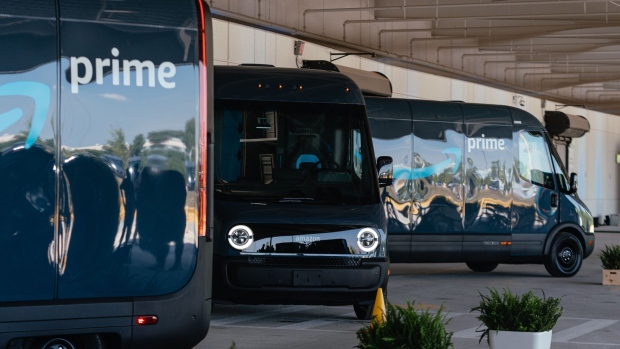Nov 7, 2023
Rivian Ends Amazon Van Exclusivity, Raises Production Forecast
, Bloomberg News

(Bloomberg) -- Rivian Automotive Inc. ended an exclusivity agreement to sell battery-electric vans to Amazon.com Inc. as the automaker raised its forecast for its overall production this year.
Effective immediately, Rivian will be allowed to negotiate new deals to sell its electric delivery vans to other fleet operators, the company said in a statement Tuesday. Rivian still plans to honor its original deal with Amazon to deliver 100,000 vans to the e-commerce giant by 2030.
Irvine, California-based Rivian also now expects to build 54,000 EVs this year across its two consumer models and the vans it supplies to Amazon, according to a letter to shareholders. That’s 2,000 vehicles more than prior guidance given in August and up from its original target of 50,000 for 2023 it signaled to investors in February.
Rivian rose 9.1% in US premarket trading to $19. If this gain held, the company would add $1.51 billion of market cap. The stock is down 5.5% so far this year through Tuesday’s close.
Analysts were positive on both major developments. Morgan Stanley’s Adam Jonas, who has an overweight rating on the stock, focused on Rivian’s cash burn rate but sees sufficient liquidity to last the EV-maker through 2025. Baird’s Chris McNally sees the end of Amazon’s exclusivity on vans as “key upside potential” that will help Rivian toward capacity to build more than 60,000 EDV units per year.
EV rival Lucid Group Inc. on Tuesday cut its 2023 production forecast, saying it would make 8,000 to 8,500 vehicles. That’s down from its already lowered guidance of 10,000 units this year. The Newark, California-based company focuses on the luxury end of the EV market but has struggled with supply chain challenges and ramping the output of its Arizona plant.
Read More: Lucid Shares Slide After Cutting Year Production Goal
Rivian is seen as a front-runner in a large pack chasing market incumbent Tesla Inc. After a blockbuster listing in 2021, the company struggled with supply chain challenges and ramping production. It has since managed to accelerate its output from a sole operational plant in Illinois over the course of this year.
Rivian builds a plug-in pickup called the R1T and a boxy sport utility vehicle called the R1S for consumers, alongside the commercial vans for Amazon.
The company’s 2019 deal gave Amazon four years of exclusivity on the vans from the point of receiving the first vehicle, and a right of first refusal on all vans produced in the subsequent two years. Amazon started taking delivery of the vans and putting them on US roads in July 2022. It is also Rivian’s biggest individual shareholder, owning 16.7% of the stock, according to data compiled by Bloomberg.
Rivian had a loss of $1.19 per share on an adjusted basis last quarter, according to the statement. That was better than the $1.32 per share deficit expected on average in estimates compiled by Bloomberg. Revenue was $1.34 billion in the third quarter, slightly above expectations.
Rivian ended the quarter with $7.94 billion of cash on hand, or $9.13 billion including restricted cash and short-term investments.
This story was produced with the assistance of Bloomberg Automation.
(Updates with premarket trading in fourth paragraph and analysts reaction in the fifth.)
©2023 Bloomberg L.P.





